Star Wars, Love, Loss & Redemption
Often studied in relation to its structure, heroic characters, sweeping score and extensive cultural impacts, George Lucas’ Star Wars saga is no stranger to artistic critique. Philosophical explorations of the films reveal that there is much to be gleaned from the work in relation to choices of virtue and vice. However, above courage, forgiveness or even the titular Hope, there is a strong argument to be made that Star Wars and its characters are defined by one driving force: love.
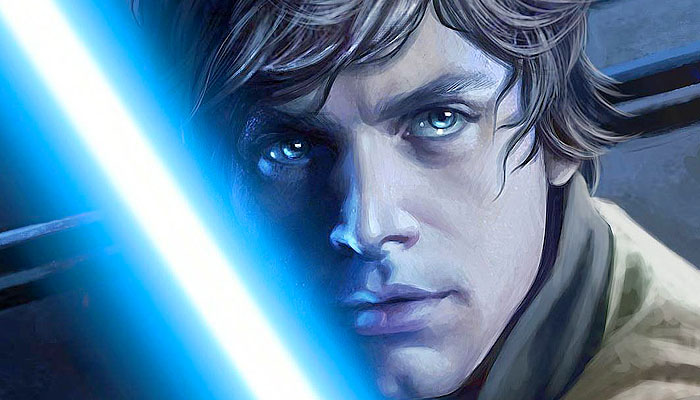
Though Star Wars is not at heart a love story, love is the distinct thread that laces key choices throughout the narrative. The first 6 films of the saga tell the story of Anakin Skywalker and of his son Luke, both belonging to the Jedi line, and both born to address or redress the balance of power between good and evil. As creator George Lucas stated, “I wanted to tell the story of Anakin. It starts with Anakin as an eight-year-old, ends when Anakin dies. […] That’s what the features are about. They’re really about Anakin, they’re about his son.” 1 Viewing the films as one epic narrative and understanding the intent in the characters’ journeys allows us to explore the essence of what defines them, namely the choices and sacrifices each make in the name of love.
Anakin Skywalker, ‘The Chosen One’
The story of Anakin Skywalker began with the young, gifted boy being separated from his mother to be trained as a Jedi, and ended 40-something years later with an act of self-sacrifice to save his son. However, what transpired in the interim was a journey of love, loss and death that led Anakin to become Darth Vader, a genocidal, despotic and pseudo-fascist cyborg. This journey is chronicled in the first 6 films of the Star Wars saga, with emphasis on Anakin’s descent into darkness in the Prequels; films 1-3: The Phantom Menace, Attack of the Clones, and Revenge of the Sith. Particularly, this is when we see the development of his consuming passion for Padmé Amidala, a love that directly leads to his downfall and her death. In Attack of the Clones, Anakin describes his passion for Padmé as “agony”. As he says to her, “You are in my very soul, tormenting me.” This experience of love as torment sets the tone for their relationship, and shows the audience early on that Anakin’s perception of love is not a constructive or positive force.
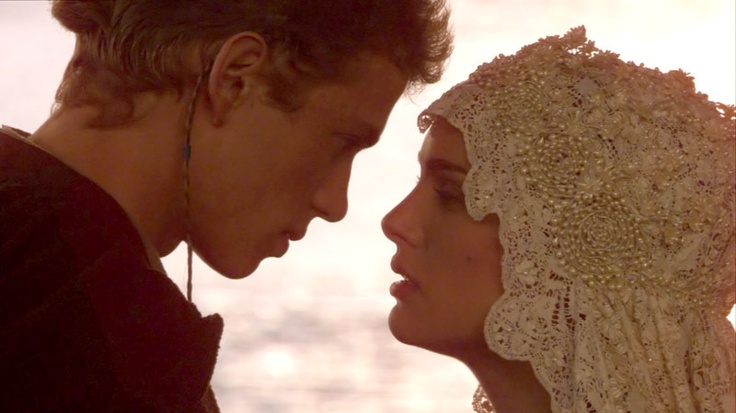
Even musically, Vader’s theme and leitmotif, 2 The Imperial March, is foreshadowed in Anakin’s theme throughout these films, foreboding a looming perdition. When Padmé asks Anakin whether he is allowed to love under the Jedi code, Anakin responds, “Attachment is forbidden. Possession is forbidden. Compassion, which I would define as unconditional love, is central to a Jedi’s life, so you might say we’re encouraged to love.” This distinction marks exactly where the nature of Anakin’s love fails, as he feels keenly emotional attachment and possession for key females in his life, his mother and Padmé, and struggles with a dangerous lack of compassion. Although Anakin and Padmé secretly marry, the positive force of their love is overshadowed by Anakin’s fear of losing her. When he develops visions of her death, he seeks greater power to control events and chooses the Chancellor Palpatine’s offer of a dark and evil “pathway to power,” – the path that leads him to becoming Darth Vader.
The nature of his love for Padmé, the fear that she will be taken away and his desperate need to keep her, exposes Anakin’s Achilles heel and precipitates his downfall: “Just help me save Padmé’s life. I can’t live without her. I won’t let her die. I want the power to stop death. […] I pledge myself to your teachings. To the ways of the Sith.” This speech, though passionate, shows Anakin’s love to be truly flawed. That he can’t live without her and ‘won’t let her die’ shows an emphasis on the self and lack of consideration for the broader consequences of his choices. Indeed, when Padmé confronts Anakin, she iterates that “All I want is your love.” Anakin responds, “Love won’t save you, Padmé. Only my new powers can do that.”
In George Lucas’ own words, “it’s Faust. If you’re going to sell your soul to save somebody you love, that’s not a good thing. That’s unnatural. You have to accept the natural course of life.” 3 Anakin’s decision to choose greater power over the inherent virtue of his love sets his fate. Following the birth of her and Anakin’s twins, Padmé dies of heartbreak, bringing about the fulfilment of Anakin’s worst fears as the outcome of his own actions.
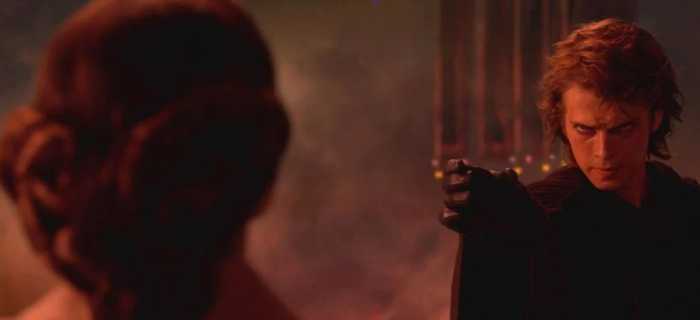
It is the nature of his love that leads Anakin to the dark side. Although it is devoted and does lead to sacrifice, we are shown from the first that it is possessive and distrustful, led by emotion and passion rather than self-control, confidence and trust. To explore love for what it can be, and what Anakin’s path ought to have been, we can look at love as a Virtue; a disposition towards acting in good and virtuous way over time and across circumstances. As C.S. Lewis wrote, “love […] does not mean an emotion. It is a state not of the feelings but of the will.” 4
The most commonly found forms of love are the Greek notions of eros, philia, and agape; or romantic love, friendship, and unconditional or charitable love. It is, particularly in this case, important to note that Anakin’s eros is not inherently a less ‘virtuous’ love, but is easier to approach in an inconstant manner. Indeed, romantic love is an arena in which other virtues can be displayed, and therefore has great potential to be virtuous; however romantic love can also be emotion-driven, and susceptible to ego, fear and irrationality. As philosophical scholar Marcia Homiak writes in her work Virtue and Self Love, “The virtuous person must have practical wisdom […] The rational and desiderative parts of his soul in harmony so that [he] does not suffer from akrasia 5.” 6
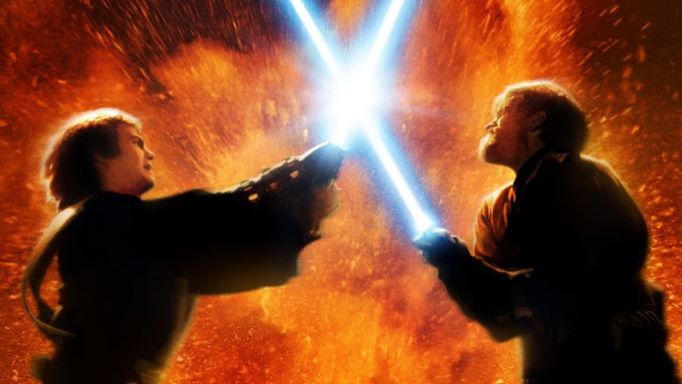
Anakin does suffer greatly from this disharmony, and the cost of this conflict is the deaths of many. His dark impulse is first encountered in the Tusken Raider tribe Anakin slaughters following his mother’s death, followed by the many Jedi children he murders under the orders of Palpatine, and in Padmé who dies of a broken heart following Anakin’s choice to embrace darkness.
It’s interesting to note that Shmi’s (Anakin’s mother), Padmé’s and Obi-Wan’s final words to Anakin are all iterations of “I love you”. Shmi’s words are meant as a reassurance, Padmé’s a plea for him to change course, and Obi-Wan’s a lament at seeing what Anakin has let himself become.
Film and TV often idealise irrationality as a romantic trope, so it is noteworthy that Star Wars should covey the passions of emotional irrationality in love as a dangerous force, a juvenile impulse that can lead to self-betrayal and destruction. As scholar Joseph Campbell noted, “When the mask of Darth Vader is removed, you see an unformed man, one who has not developed as a human individual.” 7 In Anakin we see a distinct lack, this ‘unformed’-ness, as a result of his surrender to hatred. His failure to choose and cultivate a virtuous character – a major element of development and flourishing in the individual – leads to the fundamental flaw that defines the majority of his journey.
Directly contrasting Anakin’s character, however, Star Wars episode IV introduces us to his son and adversary, Luke Skywalker, whose narrative also starts young and is defined by love, but whose disposition and ultimate choices introduce the path paved by love as virtue.
Luke Skywalker, ‘A New Hope’
Luke’s story was the first to be explored in the original trilogy (A New Hope, The Empire Strikes Back, and Return of the Jedi), before Vader/Anakin’s origins were expanded upon in the prequel trilogy.
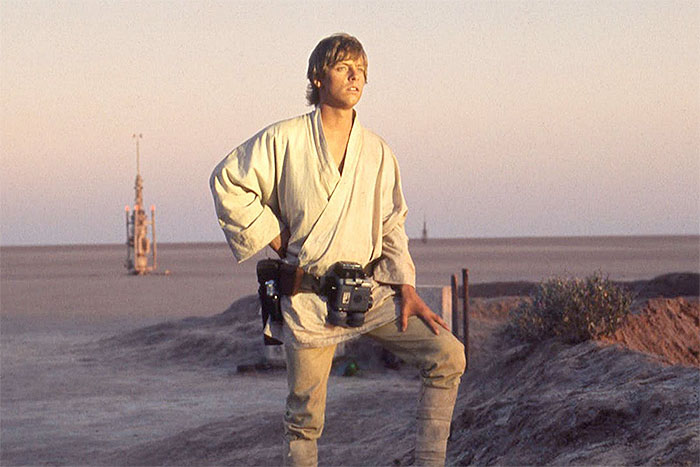
As George Lucas said following the release of the prequels, “I do see it, tonality-wise, as two trilogies. But they do, together, form one epic of fathers and sons.” 8 This idea of one overarching saga allows us to see the narratives and characters of both trilogies in light of one another. In this regard, Luke is the lens through which we can clearly contrast Anakin’s character and actions. Throughout the series, the two are frequently and intentionally paralleled. Their narratives, particularly as young adults, have strikingly similar story beats. Both grew up without fathers on the planet Tatooine and were talented pilots, both had the person/s who raised them die violently (Anakin his mother, Luke his Aunt and Uncle), both trained under Obi-Wan and began training at a later age than most, both lost their right hands to lightsabers in the second episode of their respective trilogy, and both were tempted by the Palpatine and the power of the dark side. The key difference that we see in their journeys is that when offered great power, Anakin succumbs and Luke does not.
A defining moment in Luke’s journey comes early in A New Hope. With Padm dead and Darth Vader unaware of his twins’ existence, Luke is raised by his Uncle Owen and Aunt Beru. When the pair are murdered by stormtroopers, Luke harnesses the event to give him resolve. He joins Obi-Wan to train in the Jedi ways and rescue his twin Leia; a decision that leads to the eventual victory of the light-rebellion over the dark-Empire. Luke’s musical theme is also played over this scene, indicating its importance within the hero’s journey. Markedly contrasted with Anakin’s slaughter of a village following his mother’s death, it’s already clear to the audience that Luke is disposed towards virtue and acts out of determination to see good triumph. Luke’s driving love is not a romantic one, and as his story develops, it becomes clear that deep care for his friends and family is what motivates and defines his journey.
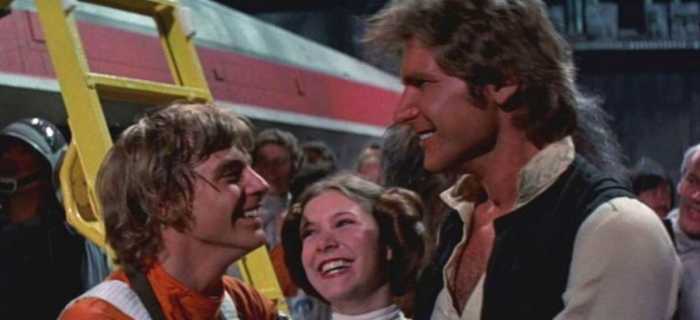
As explored earlier, this does not necessarily make his goals more noble than Anakin’s, or his love inherently more virtuous, but it is his choices and actions that makes us see the virtue and power of uncompromised love. Of course, Han and Leia’s romantic story is the source of the iconic “I love you.” “I know.” exchange, and has persisted as an example of the squabbling, lightly-antagonistic relationship trope. Their love for one another, and for Luke, is a core element of the original trilogy’s story: without the affection and devotion that develops between them, the fight against Vader and the Empire would have failed.
When Luke is reckless with his love (acting out of emotion, rather than clarity of mind), he decides to go after Han and Leia despite warnings from Yoda and Obi-Wan. This passionate but unwise choice costs him his hand in the battle with Vader, a key symbol of the cost of rushing into an emotional but dark path – mirroring Anakin’s loss of a hand in a passion-fuelled battle during his descent into darkness. However, this costly lesson gives Luke the clarity and resolve he needs to assess his motivations, and is ultimately turned into fortitude for the conflicts to come. This determination, self-knowledge, and strength of character make him powerful, and make a prime candidate for the Emperor to try and turn, as he did Anakin. Lucas himself has said that “Luke is faced with the same issues and practically the same scenes that Anakin is faced with. Anakin says yes and Luke says no.” 9. This mirroring introduces the key redemptive power of true virtuous love within the narrative.
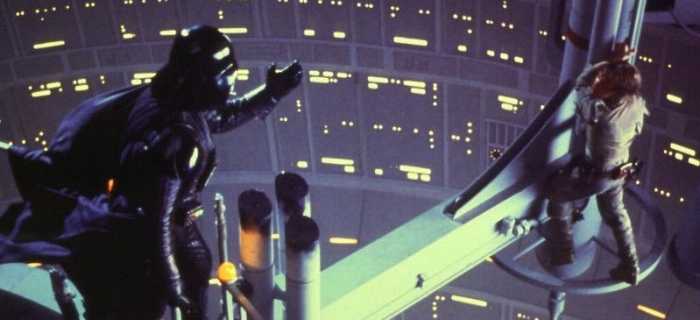
Redemption & Returning to ‘Anakin’
The final confrontation between Luke, Vader and Emperor Palpatine in Return of the Jedi epitomises the nobility and power of true love in the Star Wars saga. We see directly opposed forces: Luke is intent on defeating the emperor and saving his father, and the Emperor intends to seduce Luke to the dark side of the Force and destroy Vader. Luke says to the Emperor, “Your overconfidence is your weakness,” to which the Emperor responds, “Your faith in your friends is yours,” and Vader adds, “It is pointless to resist, my son.” In these three lines, we are concisely shown the state of things: The Emperor sees the bond of heart and love as a weakness to exploit (as he did with Anakin), Vader sees loyalty to love’s hope as futile, and Luke, having been already tested on all counts, knows better.
Where the Emperor succeeded in using love against Anakin to turn him into Vader, Luke’s strength comes from his self-knowledge and the love and faith he has in his friends, his cause and himself. It’s the strength of Luke’s heart and virtues that shows the transformative and redemptive nature of love. When asked to destroy Vader, Luke refuses, showing determination that darkness is not needed to conquer darkness, and that there is good buried deep in the man his father used to be: “I’ll never turn to the dark side. You’ve failed, Your Highness. I am a Jedi, like my father before me.” As Star Wars scholar Anne Lancashire writes, “The temptation before [Luke]: to pervert love, through hatred, pride, and fear; to destroy, in killing his own father, his own humanity; to become altogether (as the visual emphasis insists) inhuman, like his – and Vader’s – mechanical black hand.” 10 As Vader never did, “Luke chooses love over destruction or escape.”
When the Emperor then turns his powers on Luke, intending to kill him, Vader responds to the dignity and virtue of his son and rises to the call. He chooses his son’s cause, finding his deep-buried light and at last choosing love, sacrificing himself to destroy his dark master. Vader is, according to the series’ creators, “a pathetic individual who made a pact with the Devil and lost. And he’s trapped.” 11 Luke’s love and compassion, his determination to not give in to hatred despite everything, opens up a chance for Vader to make the right decision; “Only through the love of his children and the compassion of his children, who believe in him, even though he’s a monster, does he redeem himself.”
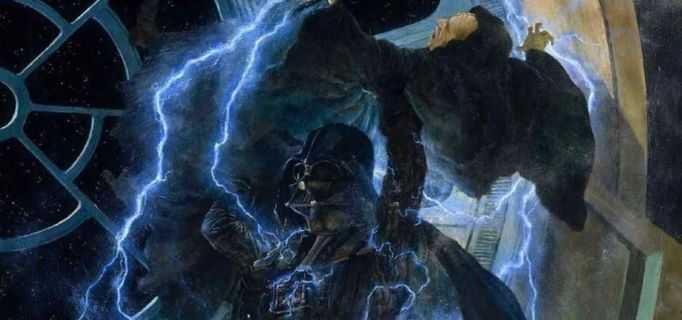
The ultimate power of this one redeeming action is shown in the final scene of Jedi, where Anakin is shown in his younger, incorrupt form alongside the other Jedi mentors, Yoda and Obi-Wan. In the words of Anne Lancashire, “The main Luke-Vader plot in Jedi shows above all idealistically and symbolically: maturity as the victory of self-knowledge and cooperative love […] over hatred, violence and fear.” 12
Seeing Anakin and Luke’s journeys side by side delivers a powerful message on the nature of love, and how its actions over time will drive and define our own personal narratives. It allows us to better understand and recognize the steadfastness of its virtue by contrasting the intent, tests and mistakes told through the paths of father and son. True love as seen in Luke is selfless, persistent and consistent; it is motivated by good, steadfast in its light and flows from positive intent. Conversely is the passionate love as seen in Anakin, a passion and desire equally powerful and dedicated, but thwarted by fear and collapsing under the desire for revenge.
The culmination of both storylines in Return of the Jedi show, as Lancashire concluded, “successes by the central characters replacing what we now clearly see to have been earlier failures under similar circumstances; and successes are achieved through the understanding and control of the darker emotions […] together with the full developments of the positive emotions of cooperative friendship and love.” Essentially, Jedi, by showing us the fulfilment of Luke and Anakin’s stories, allows us to view Anakin’s story in its entirety, and consider the immense impact (epic or catastrophic) love’s choices may have on individual journeys, and ultimately on the delicate and intricate balance of all things.
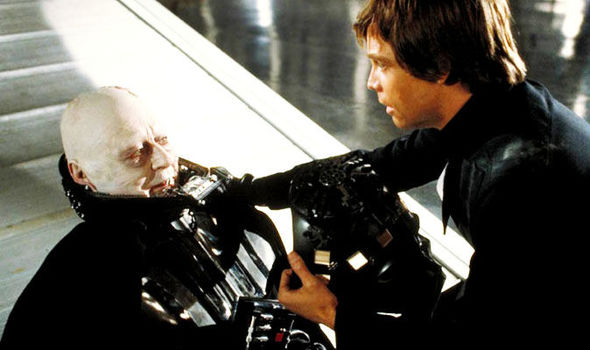
Works Cited
- Moviefone. “’Star Wars: Episode III – Revenge of the Sith’ | Unscripted | Hayden Christensen, George Lucas.” YouTube video, Sep 17, 2012. ScreenSlam. “Star Wars The Clone Wars: George Lucas Exclusive Interview.” YouTube video, May 4, 2015. ↩
- Leitmotif: a recurrent theme throughout a musical or literary composition, associated with a particular person, idea, or situation (Oxford English Dictionary) ↩
- Jim Windolf. “Star Wars: The Last Battle”. Vanity Fair, Feb. 2005. ↩
- C.S. Lewis. The Four Loves (1960). HarperOne, UK: Harper Collins. 2017. ↩
- Akrasia: Weakness of will; lack of self-control. ↩
- Marcia L. Homiak. “Virtue and Self-Love in Aristotle’s Ethics.” Canadian Journal of Philosophy 11, no. 4 (1981): 633-51. ↩
- Jim Windolf. “Star Wars: The Last Battle”. Vanity Fair, Feb. 2005. ↩
- ibid. ↩
- ibid. ↩
- Anne Lancashire. “Return of the Jedi: Once More With Feeling.” Film Criticism 8, no. 2 (1984): 55-66. ↩
- Jim Windolf. “Star Wars: The Last Battle”. Vanity Fair, Feb. 2005. ↩
- Anne Lancashire. “Return of the Jedi: Once More With Feeling.” Film Criticism 8, no. 2 (1984): 55-66. ↩
What do you think? Leave a comment.










It’s actually rare in my opinion but fairly clear
Thanks for this. Star Wars is something to celebrate and well beyond the limiting scope of film criticism. For many of us it’s steeped in nostalgia, which unfortunately has the negative effect of viewing its continued growth more harshly than we otherwise might. It’s refreshing to read an article that isn’t through this tired lens, isn’t mired in the obsessive bitterness plaguing many fortysomething fanboys, and actually dives into some discussion on its themes of love and redemption.
The originals are classics, I can watch them again and again.
Agree with everything in this article. Technically Star Wars is a true story; it is a metaphor for the human struggle between the desire to live and love, and the opposing desire to covet the resources of the universe.
I agree, but that makes it a metaphor, not a true story?
A metaphor for reality.
Yet to live and love you need resources. Hence war, because at the vert root of it people will decide their right to live and love and the resources it requires are more important than someone else’s right.
Well actually, it’s more basic than that. It’s the eternal struggle between good and evil as played out by magical beings. Very similar to Hindu mythology I think on that level.
Star Wars could be space opera, except that the stories are rather mundane: space operas are stories set on the largest astronomical scale with the largest themes of life, death and love, often ridiculous extremes of peril and wonder and usually a positive, or at least hopeful, outcome. Asimov’s Foundation, Iain M Banks’ Culture, the egregious David Weber’s Honor Harrington and Stan Robinson’s 2312, for instance.
Star Wars is an archetypal example of space opera. Space opera has no particular relation to high minded themes, nor to opera.
I remember my dad taking me to the cinema to see the first Star Wars. Thanks dad, you’re a legend.
I’ve been watching the films again recently as an adult. Star wars and Empire are still good but Jedi goes really cutesy. Then the next three are awful. Awakens is a really good film I think, but it’s basically a remake/tribute to the first one. The clone wars cartoons are really bad. Just my opinion
If you dismiss “The Force Awakens” for its lack of originality, then you really should level the same criticism at “A New Hope” itself, which borrowed heavily from numerous sources. Personally, I don’t see “The Force Awakens” as a re-tread; sure there are homages, but nothing so blatant as to label it a re-make.
I’ve lost count of how many times I’ve watched Star Was over the years, but that first time has kept the love alive, and the fact old and new audiences are still inspired by the lives of these characters is a testament to its status in film history.
It remains one of the great opening scenes in cinema. It is still excellent after all these years and all these viewings.
I remember the first time I saw it like yesterday. The music, the intro scrolling into the distance of space, the blackness, the planet, then that huge spece ship going over the top of you. AMAZING. Best opening sequence ever !.
Star Wars is wonderful escapist fantasy. I even like episodes 1,2, and 3. Certainly not the worst movies ever, as some people make out.
Great piece. Regardless of what Lucas has become, Star Wars was created with philosophical research. the characters are meant to be archetypes and tell universal stories that we can all relate to, albeit on a grand scale. He developed the script based upon Joseph Campbell’s Hero With a Thousand Faces. Which is well worth a read.
George Lucas may be a great film maker, but I still haven’t forgiven him for Jar Jar Binks.
Jar Jar forever! Binks Rules OK!!
Yes, it is a soap opera and, like most soap operas, it’s facile, predictable, cliched and riven with the semiotics of power and privilege about which it remains an unconscious, naive proponent. And that’s why we love it!
I think this is where the newer films have fallen down. They are so busy trying to tie everything together or throwing in silly easter eggs to make supposed fans happy that they have forgotten what made the original films so good its theme of love.
Star Wars needs a jaw-extending, acid-for-blood, dome-headed xenomorph like Alien to shake things up a bit. Way too many saxophone-playing, long-nosed, blue-faced, cutesy creatures for its own good.
Thoroughly enjoyable read, made really nostalgic.
When the very first one came out in 1977 I was 11 and full of excitement as I went down my local ABC one night and asked a couple if they would say I was with them so I could go in and watch it (can you imagine!).
I’ve enjoyed all of them, absolutely loved the main canon of Star Wards films – including the The Last Jedi, I even enjoyed Solo – but, Rogue One was a fantastic film and in my humble opinion the best since the Originals.
It eventually lost it’s air of mystery. What was the force? Who was Luke and Leia’s mother? What happened to the Republic? For decades there were no answers and when we got the answers, they were shit. We got midi chloirans, tax disputes, clones and the fall of Anakin Skywalker that had no surprises or twists to it. Eventually it dawned on everyone that even the creators of these stories couldn’t adequately flesh out their own narrative.
Star Wars is just a sci fi aesthetic, just forget the Star Wars part in the story process and add it in at the end. The reason the Star Wars (i.e the original New Hope) worked so well was because it could be anything, it was spun out of the Hidden Fortress and if you’d set it in medieval England, you’d barely have to change anything story wise.
It’s interesting that though the Original and Prequel trilogies are so focused on themes of love, as you’ve laid out, the Disney era of Star Wars seems to succeed at understanding this but also fail to grasp this emphasis in some important ways. Take “The Mandalorian”: the relationship between Din Djarin and Grogu very clearly emphasizes the importance of love in a relationship. Grogu is relatively helpless most of the time and is protected by Din, where Din is able to abandon his more selfish and destructive tendencies because of how he cares for Grogu. They have a healthy relationship that benefits them both. And yet the same show gives us a Luke Skywalker, having saved his seemingly irredeemable father by accepting love as a strength and not a weakness, who reverts to the old Jedi ways of isolation and cutting off one’s self from attachments in anything more than a detached, general compassion. The same Jedi ways that led to their downfall and darkness across the galaxy. It’s especially galling that Luke is the one who receives this treatment, given how integral he is to the popularity and staying power of Star Wars as a franchise. It most likely involves the fact that this show and other media set between “Jedi” and “The Force Awakens” is beholden to the unpopular version of Luke created by Rian Johnson in “The Last Jedi,” so there isn’t much the showrunners can do to deviate from that. Still, it’s baffling to me and others that those at Lucasfilm in charge of maintaining continuity can (thematically) get some relationships so right in continuing the core themes of Lucas’ story and can miss the mark so egregiously with others.
I love that though popular opinion feels a specific way about the sequels, we are still able to process them through an artistic lens.
The Star Wars universe is a wonderful place.
George Lucas is a lot of things, and a lot of mistakes were made with that film, but his heart was always in the right place.
It feels like the new films are written by committee and, unfortunately, “coherent story” is only one requirement on the Powerpoint and quite low down the list.
The original films were at a certain time and place (and I was young enough to be swallowed whole by them). At one or two steps removed, they are not “great” movies, even if great fun (as a kid). But they had an underlying tone, a red line, and I think you covered that pretty well.
The constant battle between what is right and wrong, light and dark, good and evil, is expressed beautifully in Star Wars. As this article explains, the contrast between Luke and Anakin is compelling in that they both lived nearly identical lives, but their views on the world, friendships, and faith in love is what diverts them on different paths.
Star Wars is at heart a myth. Mythology is not like any other form of fiction and very few people can write a myth. They are minimal, opaque and very hard to define exactly what makes them connect to the human psyche in a visceral way.
Star Wars is a feeling rather than a blueprint, that’s why different generations love the holy trilogy and are very forgiving about its shortcomings.
This proves Star Wars is one of film’s greatest achievements.
I have never watched one of a star wars film all the way through, I have found them exceedingly tedious and long winded.
star wars is all about love. familiar, romantic, friendly. this is a great article.
I really liked how you brought in the Greek notions of eros, philia, and agape. I think a film without well developed versions of these concepts never seem to contain nostalgic value or allow audiences to form close and relatable connections with the characters and their world.
Nice work! I especially appreciated your nods to the Greek classifications of love and Anakin’s saga as Faustian.
I found your description of George Lucas’ Star Wars films interesting in how you talk about the redemption of Anakin Skywalker from becoming Darth Vader. In all these movies, we can see the power of love; Joseph Campbell’s books talk about not submitting to a mechanical system and resisting going over to the other side as Luke Skywalker does in the third film, Return of The Jedi. So there is an element of hope and redemption in all the Star Wars movies for all humanity.
“Love can’t save you Padme, only my new powers can.” For me Star Wars is very much not about love.
I’d never consider that love was a prominent idea in Star Wars. This article, however, proved to me that it is.
There is a depth in psychology here.
It might seem easy to outline the thematic elements of a saga like Star Wars, but this article soundly examines the prominence of love throughout the films. Very well done.
This is an excellent and well-expressed article with a multitude of truths. The span of love in Star Wars goes further than even the allocated examples, it could even be expressed that in the prequels the love between Obi-Wan, and Anakan was more influential in their future than even his love for Padme. Outstanding outlook on the series as a whole.
This is a great article. As I watched the Star Wars movies, I knew I wanted to know more about the different relationships, romantic or not. Diving deep into the story between Anakin and Padme is very interesting, considering Anakin turned to the dark side to try and eventually save Padme, but he never gets the chance